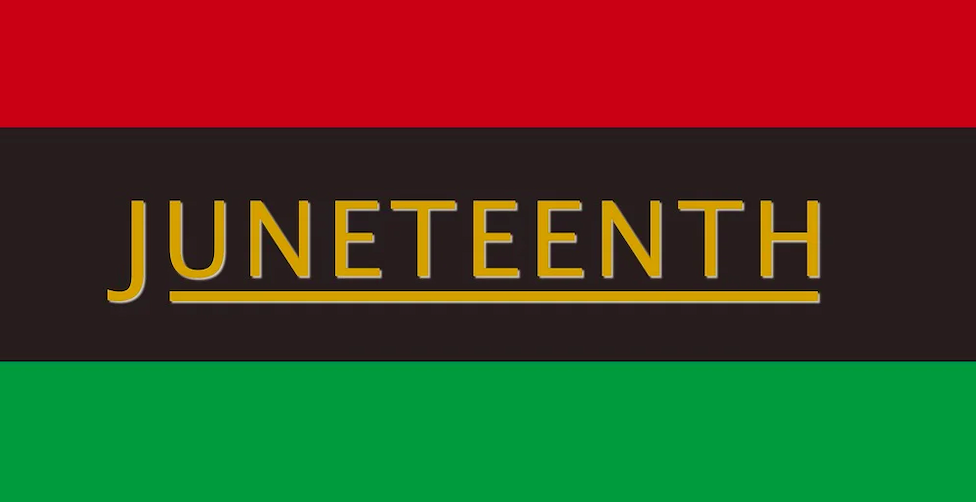Is Making Juneteenth A Federal Holiday Meaningful?

President Joe Biden signed into law yesterday a bill that made Juneteenth — the anniversary of the day the last enslaved Americans learned of their freedom — a federal holiday. Although the Emancipation Proclamation was signed in 1863, the message wasn’t delivered to the last enslaved Black people in Galveston, Texas, until June 19, 1865.
While ultimately a good thing, making Juneteenth a national holiday is an overdue acknowledgment of one of America’s greatest sins. Overdue is, in fact, the perfect way to describe America’s grotesque and tardy response to slavery at every turn. Take the origins of Juneteenth itself: The Union soldiers didn’t arrive in Galveston until about two years after the Emancipation Proclamation. This tardiness rears its head in modern times, too; consider that Mississippi didn’t officially outlaw slavery until 2013, blaming an “oversight" for this omission.
Throughout its history, America has always exhibited a pattern of negligence toward its Black captives-turned-citizens. It indicates a lackadaisical, and frankly, lazy approach to the restitutionion owed to Black people and leaves us with a nation that attempts to rectify its wrongdoing with hollow and ill-conceived solutions.
In addition to being overdue, this symbolic gesture is just that: a symbol. As civil rights icon Malcolm X once said, “The white man will try to satisfy us with symbolic victories rather than economic equity and real justice.” Passing this bill is a nice symbol, but it is hardly a meaningful stepping stone for Black liberation.
What’s more, it’s a symbol that feels somewhat hypocritical given America’s frightening activity in response to the still-tangible legacy of slavery. At the same time that America has made Juneteenth a federal holiday, it’s preventing people from teaching about it in schools. As we celebrate Juneteenth’s recognition, we should also acknowledge the slew of lawmakers across the country who are trying to ban the teaching of critical race theory as well as The 1619 Project, ultimately upholding the whitewashing of American history. Then there’s the Senate’s inability to pass the John Lewis Voting Rights Act while lawmakers across the country push for stricter voter suppression laws that would undoubtedly continue to disenfranchise marginalized communities. We must also recognize the wave of anti-protest bills aimed at criminalizing protesters, which would overwhelmingly harm Black and brown people exercising their right to protest. All of these issues are directly tied to the legacy of slavery.
The Juneteenth bill has no impact on disenfranchisement, miseducation, erasure, suppression, or criminalization of civil rights, nor should we pretend it does. It recognizes the death of a sadistic practice that wrought transcendent trauma, but it does not interact with that trauma itself. In this way, it’s similar to the other ways America has historically “recognized” Black history — namely, by obscuring the legacy of significant Black figures and events of their power to neuter their true effect. Take Martin Luther King Jr. Day: His birthday was finally recognized as a holiday in 1983, 15 years after he was killed. Nearly 40 years later, we’re having to reclaim his legacy because he’s been rewritten into an appealing political figure instead of the enemy of the state he actually was at the time of his death.
While Juneteenth deserves to be a holiday, therefore, America is fundamentally incapable of observing the date with tact. Juneteenth is fundamentally about the cessation of labor and emancipation from servitude, but how long will it be until brands stumble over themselves to kickoff Juneteenth sales to turn a profit? America has also shown it can’t observe holidays that aren’t rooted in Anglo-Saxon roots with any semblance of sensitivity; our relationship with Cinco de Mayo has proven as much. Despite Juneteenth being an American event, it is in no way traditional, as it is not in the American tradition to acknowledge nor rectify the plight of Black people.
So what does passing this bill actually do?
It certainly helps to preserve a day of remembrance for a critical day in American history, raises awareness for some, and maybe brings closure to others. But ultimately it’s an indication that America is more likely to placate its Black citizens than enact feasible protections for their liberties, dragging its feet while it does so.
It’s a step in the right direction, but as long as we’re muddying the education about slavery, and ignoring the insidious tendrils of Black servitude that still burrow within the foundations of America to this day, celebrating Juneteenth as a federal holiday ultimately rings hollow. Juneteenth deserves to exist as a national holiday; the problem is the nation simply doesn’t, and might not ever, understand the holiday itself.
More articles by Category: Race/Ethnicity
More articles by Tag: Racism, Slavery


























